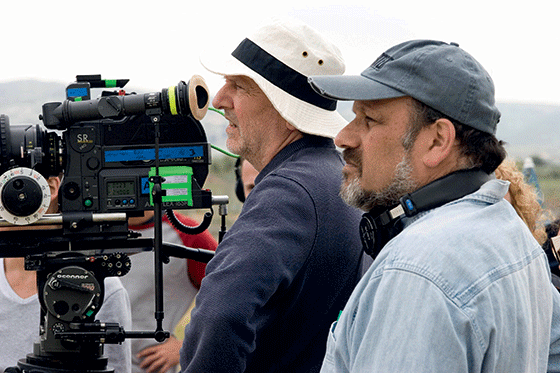Cinematic propaganda is in the eye of the beholder.

The term ‘propaganda’ in the Anglo- Saxon world has a strongly negative connotation, especially in modern times.
It is the biased and lying communication of enemies, like Cold War “Russian propaganda.” Obviously, there is a point of view problem here.
If one talks in particular about movies and propaganda, many cinephiles will invoke the name of Leni Riefenstahl, the legendary German director whose Triumph of the Will of 1935, about a Nazi party rally in Nuremberg the year before, was meant to celebrate and further consolidate the Nazi regime – and was also a triumph of filmmaking technique, giving it a unique place in cinema history as a work that is “great but evil,” as the late US critic Roger Ebert put it in a review. He then went on in his piece to try to provide a corrective to the view that it is an instance of great filmmaking at all.
Wanting to play the devil’s advocate, it could also be argued that every good film ever made is a form of propaganda, since the term can be loosely defined as “material used to promote a particular point of view, often of a biased or subjective nature.”
Indeed, in movies, it is exactly a particular point of view – ‘fair’ or not – that can make the work special and worthwhile. Only boring films lack an agenda; to have something interesting to say, you need a personal vision and a message.
A dominant idea in film criticism is the so-called ‘auteur’ theory, first theorised in France in the mid-1950s by critics who would later become the directors of the French New Wave. It is entirely constructed around the concept that, although almost all films are produced through a long and complicated industrial process that requires not only large groups of creative people but also technicians and equipment, the director is the sole author of the film because the film offers ‘his’ point of view.
This, if the filmmaker is any good, is a point reinforced by the director’s sense of aesthetics and his or her mastery of elements such as editing and cinematography, even when these factors are specifically attributed to others in end-of-reel credits.
If we combine the idea of the auteur theory with the often negative connotations of propaganda we talked about earlier, the director could be said to be the ‘dictator’ of the film, the one who finally decides what it must all mean and how it needs to be conveyed and, one supposes, what the desired effect of the film on the audience should be. Of course, as soon as we get political, the fine line between art and what some people call propaganda can become blurred.
This is certainly the case with the work of Israeli filmmaker Eran Riklis, whose pacifist and often multi-sided approach to the tensions in the region have, perhaps paradoxically, not made him very popular in his own country.
Riklis has made a name for himself in world cinema as the director of films such as The Syrian Bride and Lemon Tree, both works that look at the Arab-Israeli conflict from very personal perspectives. The first is about a cross-border Druze wedding and the later work on the fate of a lemon grove owned by a Palestinian woman who has the bad luck of living next door to the Israeli Minister of Defence – who wants the trees cut down because they could shelter terrorists.
His latest effort, Dancing Arabs, premiered at the Jerusalem and Locarno film festivals this year and is a dense but effective film adaptation of a bestselling and partially autobiographical novel by Sayed Kashua about growing up as an Arab-Israeli in Israel and specifically being one of the few Arab-Israeli students at one of the country’s best schools. Most of Riklis’s films literally – but even more metaphorically – cross borders to look at how daily life in a region that is so full of tension and potential violence impacts apparently simply things like going to school, getting married or harvesting lemons.
There’s a telling moment in Dancing Arabs when the protagonist, the Arab-Israeli teenager Eyad, erupts in a literature class, suggesting that Israeli novels and plays have an almost inherent bias against Arab characters – including himself, even if Eyad doesn’t say so, though that seems to be his direct, everyday experience.
There’s rage and a strong sense of injustice in his tirade and one feels that Riklis, who has often worked with Arab-speaking actors as well as Israelis, is almost directly addressing his critics in Israel, who have accused his films of being too pro-Arab simply because they show both Arabs and Israelis as equally flawed human beings, trying to get on with their lives under exceptionally difficult circumstances that seem to have become normal.
With Riklis’ films, it’s often the director’s straightforward humanitarianism that’s mistaken for propaganda in the negative sense of the word, though as a director in the auteur mould, he could be seen as a dictator obsessively interested in spreading a message of peaceful co-existence.
The term ‘propaganda’ in the Anglo- Saxon world has a strongly negative connotation, especially in modern times.





